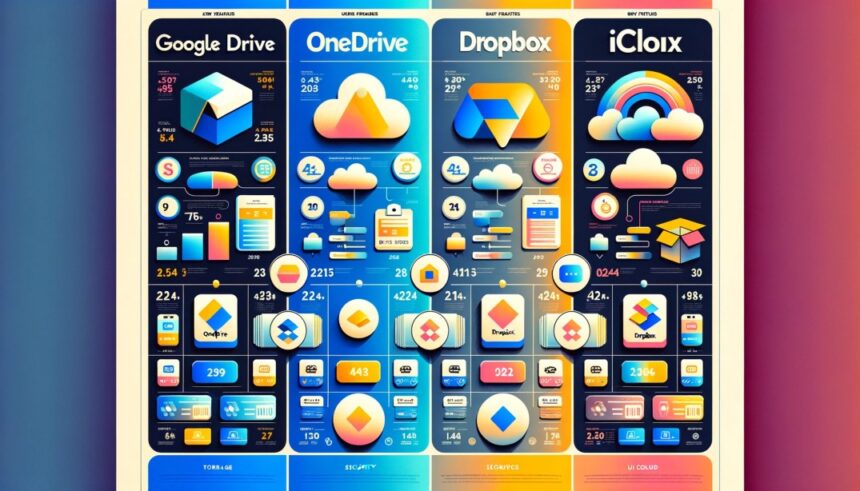Whether it’s Photos, documents, backups, or any other form of data – storing own files in the cloud has become a normality for many users in 2024. Nowadays, there are plenty of companies providing cloud-storage solutions but how do their services stack up? Who offers the most storage for the lowest price and what does expanding storage cost? We will tackle those and more questions in the following article.
From the dozens of cloud-storage providers out there we picked the four most popular ones for this comparison: Google Drive, Microsoft OneDrive, Dropbox, and Apple’s iCloud.
All four services offer practical smartphone apps as well as an upload manager for your desktop, allowing you to keep your files in the cloud synched across all your devices in the background.
Google Drive: 15 GB for Free
Google was one of the pioneers when it comes to online storage. As far back as 2004, Google announced it’s Gmail service that offered a mailbox with 1GB of free storage. Offering this much space for free was unheard of at that time. Most e-mail providers where still only offering a handful of megabytes.
Nowadays, signing up for Google Drive will get your 15 GB of storage for free that, however, is used for all your Google services like Gmail, Google Docs, etc. That means you’ll have less space for these services.
Of course, Google are offering expansion options for Drive: 100 GB for 1,99€/Month, 1 TB for 9,99€/Month, and even 10 TB for 99,99€/Month.
Tip: If you’re primarily using your cloud-storage for photos, its worthwhile checking out Google Photos where uploaded photos don’t take away from your storage in Drive – assuming you remember this detail: When uploading photos, always select the “High Quality” option. This will compress large photos down to a 16 MP resolution and Google will not count these when calculating storage space remaining. If you choose to upload them in their full size they will be occupying space in your Google Drive storage (unless you’re using a Google Pixel phone). The smartphone app is also very good, and, for example, one of the few places where you’re allowed to delete all the photos on your iPhone at once.
Microsoft Onedrive: 5 GB for Free
Microsoft’s File-Hosting service has one big advantage: If you’re using Windows 10, you’re not required to install any additional software since OneDrive is integrated into the OS. With their free tier, you’re currently getting 5 GB for free which is less than what Google is offering. However, the upgrades are particularly interesting.
While the 50 GB tier for 2€/Month isn’t particularly impressive, 1 TB for 7€/Month is more so, because: When you choose the 1 TB option, you’ll also be getting an Office 365 license as a bonus. Prices get cheaper if you’re getting licenses for more than 5 people. This option only costs 10€/Month, meaning 2€/Month per person.
Tip: The best deal on the 1 TB package isn’t available on Microsoft’s website, but right here! We offer the first year of Office 365 for 5 people including 1 TB of OneDrive for 73,99€ which equates to 1,23€/Month per month per person. This is probably the cheapest way to get that much cloud-storage.
Dropbox: 2 GB for Free
Dropbox is one of the pioneers in the cloud sector and pretty much occupied a monopoly among the hip, tech-savvy crowd. Nowadays, Dropbox is but one service among many. The free tier gives you 2 GB of storage that you can expand in multiple ways. One way is to refer friends or use the smartphone app.
For private users, the 1 TB upgrade runs for 9,99€/Month.
Tip: Dropbox are partnering with a lot of device manufacturers. That means that when for example buying one of the Asus, Dell, or HP business notebooks, you’re getting a free 25-50 GB Dropbox upgrade for 6-12 months.
Apple iCloud: 5 GB for free
Apples iCloud is different from other provider’s cloud services since it doesn’t have its own dedicated smartphone app and is integrated into Apple’s ecosystem.
While Windows users will have to live without some of its features, there is a client app that makes it possible to access your iCloud from your computer. If you’re on an Android device you’re out of luck.
Apple is using iCloud as the standard service for backing up its devices from smartphones to tablets, and also synchronizing data and documents across nearly all devices in their ecosystem.
During the automatic iCloud backup of your phone for example, you can back up whatever you choose: Photos, apps, settings, and more. The main advantage: Backing up and recovering your device is dead simple and happens completely automatically. Con: The 5 GB you’re getting for free fill up relatively quickly, especially when backing up multiple iOS devices to it.
Of course, Apple are also offering paid storage expansion tiers: 50 GB for 0,99 €/Month, 200 GB for 2,99 €/Month, 1 TB for 9,99 €/Month and 2 TB for 19,99 €/Month.
Conclusion
Apart from the four providers we compared here, there are plenty of other companies offering cloud-storage solutions. In this Wikipedia article alone, you’ll find 22 cloud-storage providers, many of which are also offering free packages. So, if you don’t have a problem with spreading your files across several platforms or accounts, you can get quite a bit of cloud-storage for free.
If you’re looking to have everything under one roof, there is currently (May 2024) no cheaper way than sharing an Office 365 license with 5 of your friends.
TL;DR
Was this too much text for you? If so, here’s all the data in a handy comparison chart:
| Google Drive | OneDrive | Dropbox | iCloud |
| 15 GB free of charge | 5 GB free of charge | 2 GB free of charge | 5 GB free of charge |
| 100 GB: 1.99 € / month | 50 GB: 2, – € / month | 1 TB: 9.99 € / month | 50 GB: 0.99 € / month |
| 1TB: 9.99 € / month | 1TB: 7, – € / month | 200 GB: 2.99 € / month | |
| 10TB: 19.99 € / month | 5 x 1TB: 10, – € / month | 1TB: 9.99 € / month | |
| 2TB: 19.99 € / month |
What cloud-storage provider are you using? Which provider is missing from our roundup?




